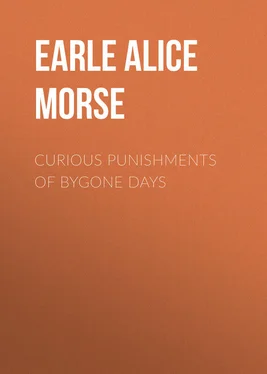Alice Earle - Curious Punishments of Bygone Days
Здесь есть возможность читать онлайн «Alice Earle - Curious Punishments of Bygone Days» — ознакомительный отрывок электронной книги совершенно бесплатно, а после прочтения отрывка купить полную версию. В некоторых случаях можно слушать аудио, скачать через торрент в формате fb2 и присутствует краткое содержание. Жанр: foreign_antique, foreign_prose, на английском языке. Описание произведения, (предисловие) а так же отзывы посетителей доступны на портале библиотеки ЛибКат.
- Название:Curious Punishments of Bygone Days
- Автор:
- Жанр:
- Год:неизвестен
- ISBN:нет данных
- Рейтинг книги:4 / 5. Голосов: 1
-
Избранное:Добавить в избранное
- Отзывы:
-
Ваша оценка:
- 80
- 1
- 2
- 3
- 4
- 5
Curious Punishments of Bygone Days: краткое содержание, описание и аннотация
Предлагаем к чтению аннотацию, описание, краткое содержание или предисловие (зависит от того, что написал сам автор книги «Curious Punishments of Bygone Days»). Если вы не нашли необходимую информацию о книге — напишите в комментариях, мы постараемся отыскать её.
Curious Punishments of Bygone Days — читать онлайн ознакомительный отрывок
Ниже представлен текст книги, разбитый по страницам. Система сохранения места последней прочитанной страницы, позволяет с удобством читать онлайн бесплатно книгу «Curious Punishments of Bygone Days», без необходимости каждый раз заново искать на чём Вы остановились. Поставьте закладку, и сможете в любой момент перейти на страницу, на которой закончили чтение.
Интервал:
Закладка:
“Whereas there is no expresse punishment by any law hitherto established affixed to the evill practise of sundry persons by exorbitancy of the tonge in rayling and scolding, it is therefore ordered, that all such persons convicted, before any Court or magistrate that hath propper cognizance of the cause for rayling or scolding, shalbe gagged or sett in a ducking stoole & dipt ouer head & eares three times in some convenient place of fresh or salt water as the Court or magistrate shall judge meete.”
Governor Bellingham’s sister was a notorious scold, who suffered death as a witch.
John Dunton, writing from Boston in 1686, does not note the presence of a ducking-stool, but says:
“Scolds they gag and set them at their own Doors for certain hours together, for all comers and goers to gaze at; were this a Law in England and well executed it wou’d in a little Time prove an Effectual Remedy to cure the Noise that is in many Women’s heads.”
This was a law well-executed at the time in Scotland, though Dunton was ignorant of it.
There are no entries to show that the law authorizing ducking ever was executed in Massachusetts nor in Maine, where a dozen towns – Kittery, York and others – were fined for “having no coucking-stool.” It was ordered on Long Island that every Court of Sessions should have a ducking-stool; but nothing exists in their records to prove that the order was ever executed, or any Long Island woman ducked; nor is there proof that there was in New York city a ducking-stool, though orders were issued for one; a Lutheran minister of that city excused himself for striking a woman who angered him by her “scholding” because she was not punished by law therefor.
Pennsylvania, mild with the thees and thous of non-belligerent Quakers, did not escape scolding women. In 1708 the Common Council of Philadelphia ordered a ducking-stool to be built. In 1718 it was still lacking, and still desired, and still necessary.
“Whereas it has been frequently and often presented by several former Grand Jurys for this City the Necessity of a Ducking-stool and house of Correction for the just punishment of scolding Drunken Women, as well as divers other profligate and Unruly persons in this Town who are become a Publick Nuisance and disturbance to the Town in Generall, Therefore we the present Grand Jury Do Earnestly again present the same to the Court of Quarter Sessions for the City Desireing their Immediate Care That these Public Conveniances may not be any Longer Delay’d but with all possible Speed provided for the Detention and Quieting such Disorderly Persons.”
For several years later the magistrates clamored for a ducking-stool, and the following indictment was brought against an unruly woman:
“City of Philadelphia. We the grand Inquest for our Lord the King upon respective oaths and affirmations Do present that Mary wife of John Austin late of Philadelphia, Cordwainer, the twenty-ninth day of September and divers other days and times as well before as after in the High City Ward in the City afforsd within the Jurisdiction of this Court was and yet is a Common Scold, And the Peace of our Lord the King a common and publick Disturber, And Strife and Debate among her neighbours a Comon Sower and Mover, To the Great Disburbance of the Leige Subjects of our sd Lord the King Inhabiting the City afforsd, And to the Evill Example of other Such Cases & Delinquents And also agt the Peace of our Lord the King his Crown and Dignity.”
As late as 1824 a Philadelphia scold was sentenced by this same Court of Sessions to be ducked; but the punishment was not inflicted, as it was deemed obsolete and contrary to the spirit of the time.
In 1777 a ducking-school was ordered at the confluence of the Ohio and Monongahela rivers – and doubtless it was erected and used.
In the year 1811, at the Supreme Court at Milledgeville, Georgia, one “Miss Palmer,” who, the account says, “seems to have been rather glib on the tongue,” was indicted, tried, convicted and punished for scolding, by being publicly ducked in the Oconee River. The editor adds: “Numerous spectators attended the execution of the sentence.” Eight years later the Grand Jury of Burke County, of the same state, presented Mary Cammell as a “common scold and disturber of the peacable inhabitants of the County.” The Augusta Chronicle says this of the indictment:
“We do not know the penalty , or if there be any, attached to the offense of scolding ; but for the information of our Burke neighbours we would inform them that the late lamented and distinguished Judge Early decided, some years since, when a modern Xantippe was brought before him, that she should undergo the punishment of lustration by immersion three several times in the Oconee . Accordingly she was confined to the tail of a cart, and, accompanied by the hooting of a mob, conducted to the river, where she was publicly ducked, in conformity with the sentence of the court. Should this punishment be accorded Mary Cammell, we hope, however, it may be attended with a more salutary effect than in the case we have just alluded to – the unruly subject of which, each time as she rose from the watery element, impiously exclaimed, with a ludicrous gravity of countenance, ‘Glory to God.’”
It is doubtful whether these Georgia duckings were done with a regularly constructed ducking-stool; the cart was probably run down into the water.
One of the latest, and certainly the most notorious sentences to ducking was that of Mrs. Anne Royal, of Washington, D. C., almost in our own day. This extraordinary woman had lived through an eventful career in love and adventure; she had been stolen by the Indians when a child, and kept by them fifteen years; then she was married to Captain Royall, and taught to read and write. She traveled much, and wrote several vituperatively amusing books. She settled down upon Washington society as editor of a newspaper called the “Washington Paul Pry” and of another, the “Huntress”; and she soon terrorized the place. No one in public office was spared, either in personal or printed abuse, if any offense or neglect was given to her. A persistent lobbyist, she was shunned like the plague by all congressmen. John Quincy Adams called her an itinerant virago. She was arraigned as a common scold before Judge William Cranch, and he sentenced her to be ducked in the Potomac River. She was, however, released with a fine, and appears to us to-day to have been insane – possibly through over-humored temper.
III
THE STOCKS
One of the earliest institutions in every New England community was a pair of stocks. The first public building was a meeting-house, but often before any house of God was builded, the devil got his restraining engine. It was a true English punishment, and to a degree, a Scotch; and was of most ancient date. In the Cambridge Trinity College Psalter , an illuminated manuscript illustrating the manners of the twelfth century, may be seen the quaint pictures of two men sitting in stocks, while two others flout them. So essential to due order and government were the stocks that every village had them. Sometimes they were movable and often were kept in the church porch, a sober Sunday monitor. Shakespeare says in King Lear:
“Fetch forth the stocks
You stubborn ancient knave!”
In England, petty thieves, unruly servants, wife-beaters, hedge-tearers, vagrants, Sabbath-breakers, revilers, gamblers, drunkards, ballad-singers, fortune-tellers, traveling musicians and a variety of other offenders, were all punished by the stocks. Doubtless the most notable person ever set in the stocks for drinking too freely was that great man, Cardinal Wolsey. About the year 1500 he was the incumbent at Lymington, and getting drunk at a village feast, he was seen by Sir Amyas Poulett, a strict moralist, and local justice of the peace, who humiliated the embryo cardinal by thrusting him in the stocks.
Читать дальшеИнтервал:
Закладка:
Похожие книги на «Curious Punishments of Bygone Days»
Представляем Вашему вниманию похожие книги на «Curious Punishments of Bygone Days» списком для выбора. Мы отобрали схожую по названию и смыслу литературу в надежде предоставить читателям больше вариантов отыскать новые, интересные, ещё непрочитанные произведения.
Обсуждение, отзывы о книге «Curious Punishments of Bygone Days» и просто собственные мнения читателей. Оставьте ваши комментарии, напишите, что Вы думаете о произведении, его смысле или главных героях. Укажите что конкретно понравилось, а что нет, и почему Вы так считаете.












